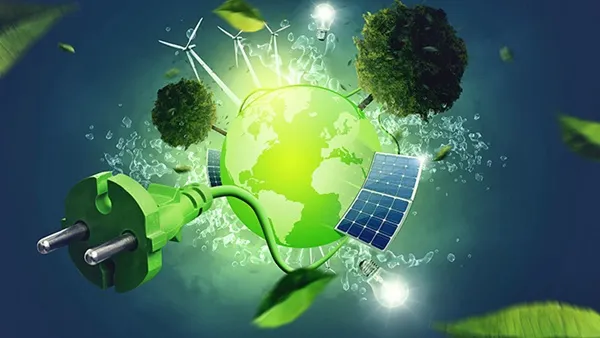With the development of technology, humanity requires a lot of electricity, as practically all devices used by people operate on electricity. Burning coal for energy production negatively impacts the environment, so various ecological approaches are being developed for electricity generation, which are also less costly.
Green Energy
Green energy is the energy obtained through the use of natural renewable sources. The main sources of such energy are:
- the sun,
- water,
- wind.
Most countries in the world still use energy by burning natural coal, but this greatly harms the environment. Every year, humanity strives for more environmentally friendly methods of energy generation.
The most popular method of renewable energy generation nowadays is solar. It is produced using photovoltaic installations and solar collectors, some harness the heat generated by the sun and convert it into electricity, while others generate thermal energy, which can be used for industrial purposes, such as creating hot water.
Wind energy is also very popular, represented by wind power plants equipped with turbines and special devices that allow energy generation. The principle of wind generators is the conversion of kinetic energy into electricity, which is considered the most profitable way of generating electricity.
Energy generated using water is also widespread, thanks to natural internal currents at hydroelectric power stations, which are located on rivers with strong currents, using special turbines that convert mechanical energy into electrical energy.
Investment Scammers
As it becomes clear, such a prospect for the planet is much better, so many organizations try to invest in this area, attempting to save the environment for future generations and make money from it.
Naturally, where there are investments, scammers always appear. They manipulate the feelings of people who fight for nature's purity and environmentally friendly energy generation. They lure them into their fraudulent schemes, offering to invest in ecological projects now.
By organizing fake funds or companies, scammers attract people with bright advertisements and promising future profits.
Scams in Eco-Projects
Recently invented fraudulent schemes in the ecology sphere are spreading widely, and a very large number of people react to them.
Sending information or notifications to people demanding the payment of an environmental fee, pretending to be agencies involved in protecting and preserving the environment. Such receipts specify details directly linked to the scammers' bank accounts or cards. Naturally, this scheme involves not just one scammer - it's a collective deception.
More large-scale projects for scammers include creating an investment fund that collects money, for example, for building wind power plants. Here, they also prepare:
- large-scale projects,
- special computer presentations,
- documents with calculations of necessary funds,
- project development drawings.
As scammers plan a large project, they need all the information to convince as many people as possible to invest in green energy and projects.
Eco-projects scammers can pass off as charitable funds that engage in:
- environmental protection;
- water purification;
- energy generation;
- waste processing plants and other ecologically important facilities.
Here, a fake project with the organization of charitable assistance is developed. In these situations, scammers don't even bother with reporting documentation and simply disappear after collecting the required amount.
Investment Fraud
Investment fraud is the skill of a scammer to deceptively make a victim invest money in:
- various projects related to alternative energy sources;
- cryptocurrency;
- stocks;
- funds;
- charity.
Scammer-investors do not always meet with potential victims, work can be done remotely, and communication can occur in messengers and social networks. Very often, scammers offer to invest in profitable projects, for example, ecological ones, or make a charitable contribution to a fund involved in nature conservation. But at the same time, they ask for your banking details. Before taking such an action, it is necessary to check whether this organization exists, whether the person contacting you is its representative. And, after figuring out the situation, do not rush to send money. Luring the victim into the scheme, they use psychological pressure, playing on people's feelings and their desire to invest in an eco-project.
 >
>